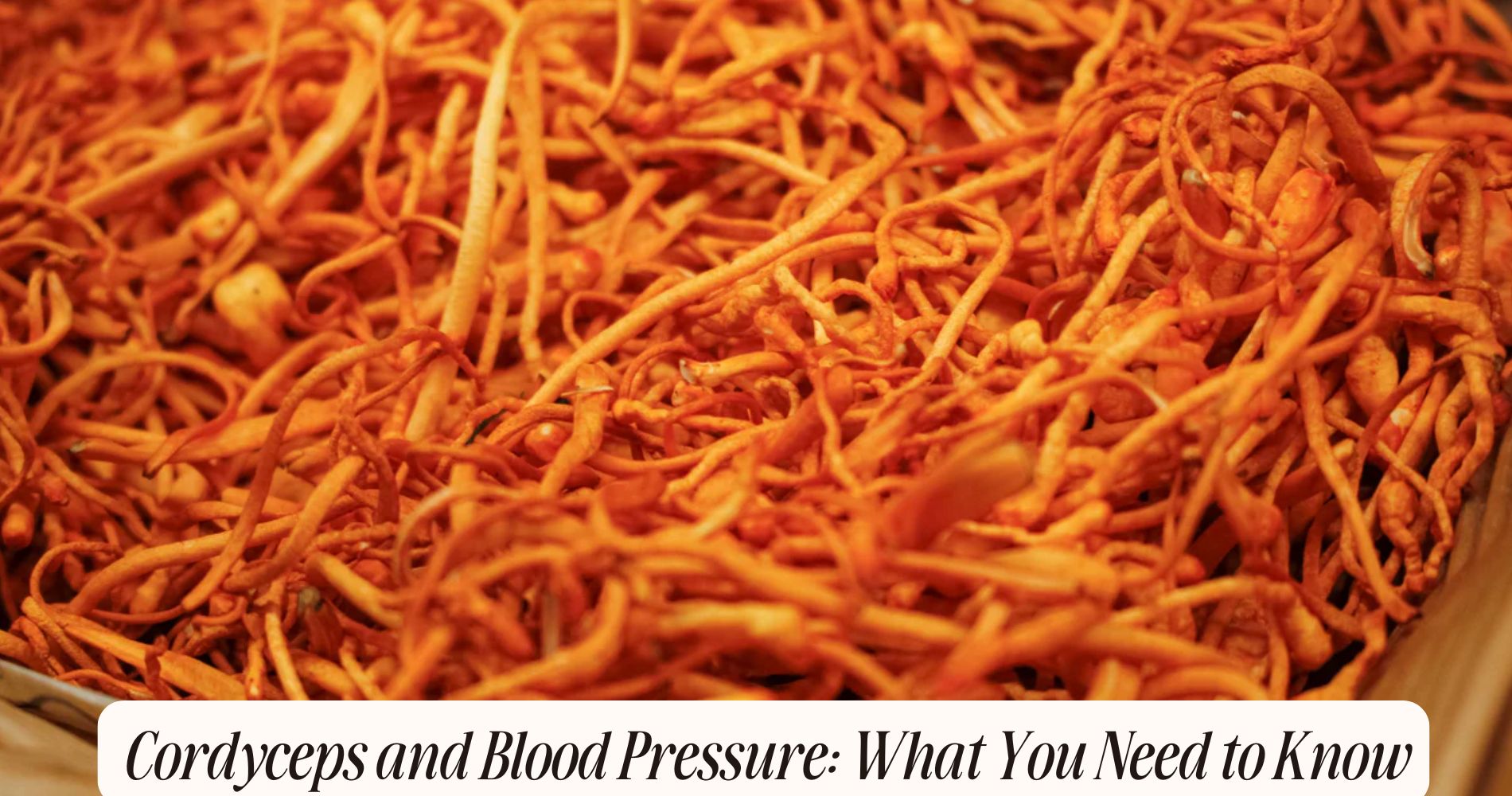
Cordyceps and Blood Pressure: What You Need to Know
If you're curious about Cordyceps and blood pressure, you should know it shows promise in managing cardiovascular health. Initial research suggests that it can support blood pressure regulation, potentially enhancing endothelial function. Typical dosages discussed in studies range from 1,000 to 3,000 mg per day. However, it's essential to consult your healthcare provider before starting, especially if you're taking anticoagulants or other medications. While Cordyceps has health benefits, it can also cause side effects like gastrointestinal discomfort or allergic reactions. By understanding its uses, you can make an informed choice about incorporating it into your health routine.
Understanding Cordyceps
Cordyceps are often recognized for their unique life cycle and potential health benefits. These fungi, particularly Cordyceps sinensis, have a fascinating history that dates back centuries, primarily in traditional Chinese medicine. They were once rare and sought after, growing in the high-altitude regions of Tibet and Nepal.
As demand for cordyceps increased, cultivation techniques evolved, leading to the development of more accessible farming methods. Today, you'll find cordyceps cultivated in controlled environments, allowing for consistent quality and availability.

This shift from wild harvesting to cultivation has made these fungi more affordable and easier to incorporate into your diet. You'll discover cordyceps in various forms, including powders, capsules, and extracts, each offering a convenient way to enjoy their benefits.
Understanding cordyceps history and cultivation not only enriches your appreciation for these fungi but also helps you make informed choices when selecting products. By familiarizing yourself with their origins and the cultivation process, you can better understand the potential health benefits they may provide, paving the way for further exploration into their roles in wellness and nutrition.
Cordyceps and Blood Pressure Research
Research into the effects of cordyceps on blood pressure has gained attention as more people seek natural remedies for cardiovascular health.
Initial studies suggest that cordyceps may positively influence blood pressure through various mechanisms, such as improving endothelial function and enhancing nitric oxide production. These mechanisms can lead to better vascular relaxation and reduced arterial stiffness, which are vital for maintaining healthy blood pressure levels.
While findings are promising, it's important to evaluate the appropriate cordyceps dosage for best results. Research indicates that dosages ranging from 1,000 to 3,000 mg per day are commonly used in studies, but individual responses may vary.
Always consult a healthcare professional before starting any supplementation.
Furthermore, the specific type of cordyceps may impact its effectiveness. Cordyceps militaris, for example, has been the focus of many studies, showing potential benefits in regulating blood pressure.
However, more extensive clinical trials are necessary to establish definitive conclusions about its efficacy and safety.
Potential Health Benefits
Exploring the potential health benefits of cordyceps reveals a fascinating array of effects that may enhance overall well-being. One of the most notable benefits is its ability to support immune function. Research suggests that cordyceps can stimulate the production of immune cells, helping your body fend off infections more effectively. This immune support can be particularly beneficial during times of stress or when facing seasonal illnesses.

Additionally, cordyceps may improve athletic performance. Studies indicate that this mushroom can increase oxygen uptake and enhance energy levels, making it a popular supplement among athletes. By promoting better endurance and reducing fatigue, cordyceps can contribute to more effective workouts and quicker recovery times.
Moreover, cordyceps contains antioxidants, which help combat oxidative stress in the body. This action can lead to improved cellular health and longevity.
Possible Risks and Side Effects
While cordyceps offers a variety of health benefits, it's crucial to be aware of possible risks and side effects associated with its use.
First, you should consider that cordyceps can interact with certain medications. If you're taking anticoagulants or blood pressure medications, consult your healthcare provider before using cordyceps, as it may enhance their effects, leading to excessive bleeding or low blood pressure.
Dosage considerations are also important. While many people tolerate cordyceps well, taking too much can cause gastrointestinal discomfort, including nausea, diarrhea, or stomach cramps. It's crucial to follow recommended dosages and not exceed them, especially if you're new to this supplement.
Additionally, some individuals may experience allergic reactions, such as itching or rash. If you notice any adverse effects, discontinue use immediately and consult a healthcare professional.
Pregnant or breastfeeding women should avoid cordyceps unless advised otherwise by a doctor.
How to Use Cordyceps Safely
To use cordyceps safely, start by choosing a high-quality product from a reputable source. Look for supplements that provide clear information about their origin and production methods. It's vital to verify that any product you choose has been tested for purity and potency.
When it comes to dosage recommendations, begin with a lower dose to assess your body's response. Common dosages range from 1,000 mg to 3,000 mg per day, but you should consult a healthcare professional for personalized advice. They can help determine the right dosage based on your individual health status and any medications you may be taking.

Follow usage guidelines closely, and take cordyceps consistently to maximize its benefits. Be mindful of any side effects, such as gastrointestinal discomfort or allergic reactions, and discontinue use if these occur.
Additionally, if you have pre-existing health conditions, especially related to blood pressure or heart issues, it's important to discuss your plans to use cordyceps with your doctor.
Support Your Health with Well Gummies' Ultimate Wellness Bundle
For a convenient and delicious way to support your overall health, try Well Gummies' Ultimate Wellness Bundle. This gum chew product includes All-in-One Mushroom Gummies for daily nourishment and Lion's Mane Focus and Energy Gummies for those moments when you need an extra boost. With 10 types of mushrooms, these vegan gummies fuel your brain, enhance your focus, and support immune health. Enjoy the fresh wild berry flavor—no jitters, no crash—just calm, steady energy to help you stay balanced and energized all day!
Frequently Asked Questions
Can Cordyceps Interact With Prescription Medications?
Cordyceps can interact with prescription medications by affecting their metabolism. You should watch for potential side effects, as combining them might alter how your body processes drugs, leading to unexpected results. Always consult your healthcare provider.
How Quickly Can I Expect Results From Cordyceps?
When using cordyceps, you might expect results within two to four weeks, depending on your dosage. Consistency is key, so stick with it for the best chance of experiencing the benefits you seek.
Are There Different Types of Cordyceps Supplements?
Yes, there are different types of cordyceps supplements, including Cordyceps sinensis and Cordyceps militaris. Each has unique benefits, and the extraction method influences potency, so choose wisely based on your health goals.
Is Cordyceps Safe for Pregnant or Breastfeeding Women?
Cordyceps safety during pregnancy isn't well-studied, so it's best to avoid it. You should consult with your healthcare provider to discuss potential pregnancy effects and guarantee both your and your baby's well-being.
Can Cordyceps Improve Athletic Performance?
Cordyceps benefits include potential improvements in athletic endurance. Research suggests they may boost oxygen utilization and enhance energy levels, helping you perform better during workouts. However, always consult a healthcare professional before starting any supplement.
Conclusion
To summarize, cordyceps may offer potential benefits for blood pressure regulation, but research is still limited. While it shows promise in some studies, it's important to approach it with caution. Always consult your healthcare provider before adding cordyceps to your routine, especially if you're on medication or have existing health conditions. By staying informed and using cordyceps safely, you can make better decisions for your health and well-being.




